A Safari Where Water, Mountains & Remote African Bush Meet: Fothergill Island, Matusadona National Park, Zimbabwe May 8, 2023
Lake Kariba, in Northern Zimbabwe, 140 miles long by 20 miles wide, is the largest man-made lake by volume, in the world. This vast body of water forms the Northern boundary of Matusadona National Park. The mighty Zambezi River was dammed in 1958, causing the river to rise dramatically and to flood the area with its forests of Mopani and Leadwood trees. Today, the sun-whitened skeletons of these drowned trees line the banks of Lake Kariba in eerie clusters. During a Sunset Safari Cruise from Fothergill Island - on a spanking new motorboat - I gaze at the spectral branches where Fish Eagles build their nests and White-breasted cormorants, Wire-tailed swallows and Grey-headed gulls perch. Sipping the traditional gin and tonic of an African Safari, I watch elephants sporting in the lake.
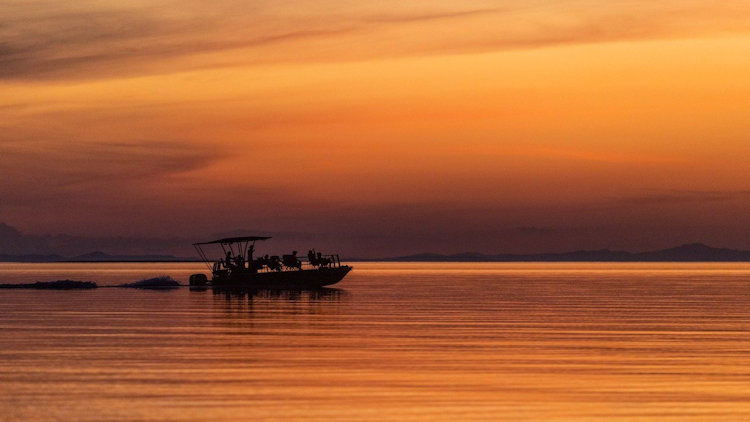
Image by Scott Ramsay
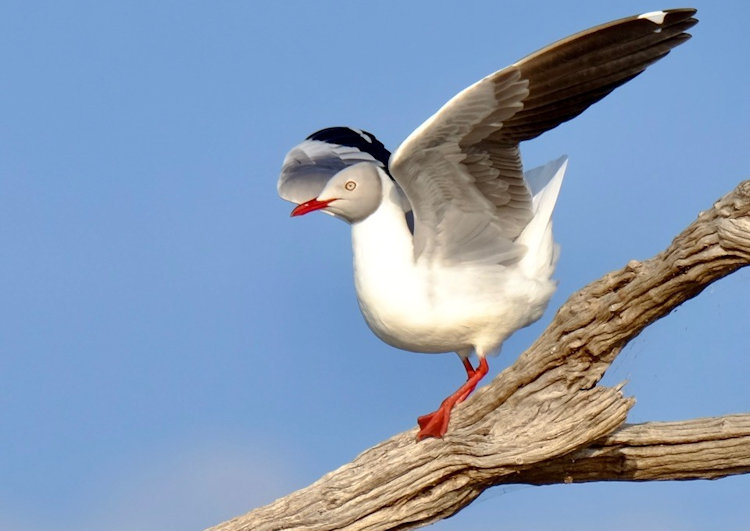
Image by Gillian McLaren
The fast-fading light on the water, glistens with reflections of a vivid orange and melted bronze sunset. As darkness approaches, pods of hippo watch us warily, as they prepare to climb out of the water on their stubby legs, to graze on the surrounding grasslands, safe from dehydrating sunshine. Nile crocodiles abandon the lake edges where they have been sun-basking, to slip into the water, where they lurk, they watch, lingering for unsuspecting prey.
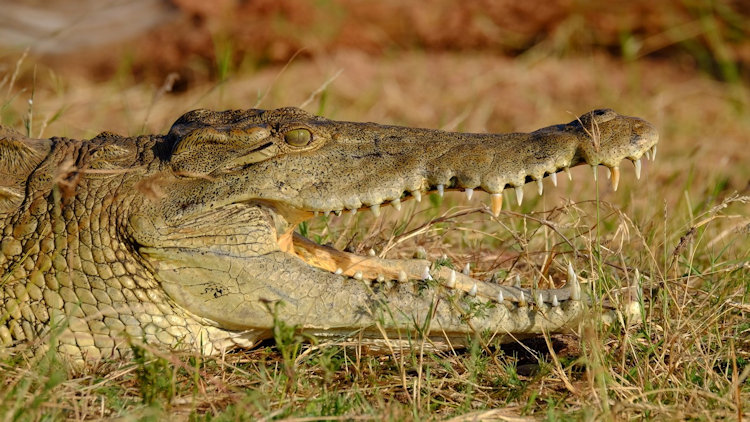
Image by Gillian McLaren
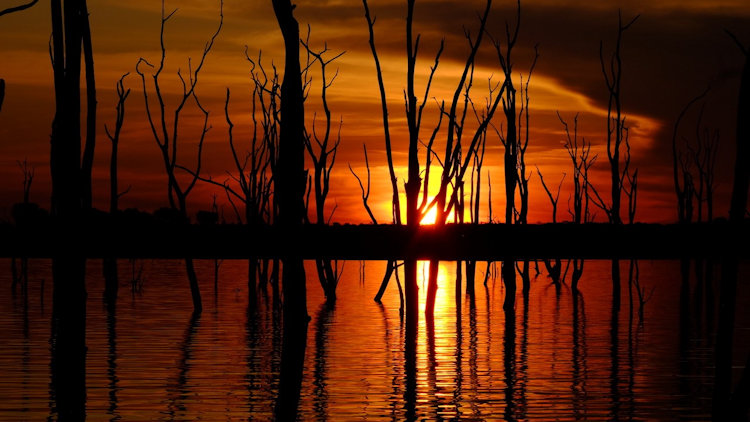
Image by Gillian McLaren
The grasslands of the savanna, with Mopane Woodland, descending from the Matusadona hills, forms the perfect habitat for an increasingly healthy population of African elephants, lions, leopards and herds of African Buffalo, plus over 240 bird species. On a Walking Safari - with two armed game guides from Fothergill Island - I am shown the tracks and dung that identify the presence of Waterbuck, kudu and impala. These antelopes - as well as other animals like African civet and Water mongoose - have been down to drink in the Kanjedza River, where we are exploring the river bed. Observing silence and walking in single file, we disturb a hippo that rushes away from us out of a pool of water, still carrying two terrapins on its back.
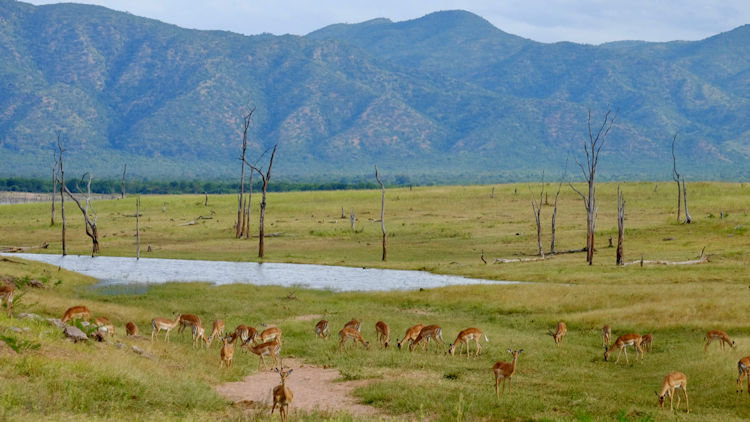
Image by Gillian McLaren
Crouching down, we slowly and carefully approach a herd of African Buffalo. When they see us, they react with curiosity and move closer. As we stand up they move back a bit, still staring at us. Sitting down now, we are able to watch them grazing and chewing the cud, as they are relaxed with the distance we are keeping. It’s this fertile floodplain, the open grassland where buffalos can see us, as well as the experience of the game guides from Fothergill Island that allow me to have these extraordinary and astounding moments.
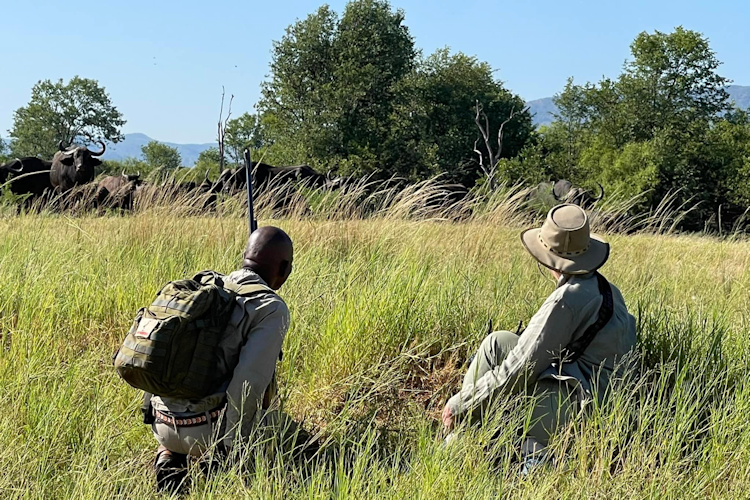
Image by Gillian McLaren
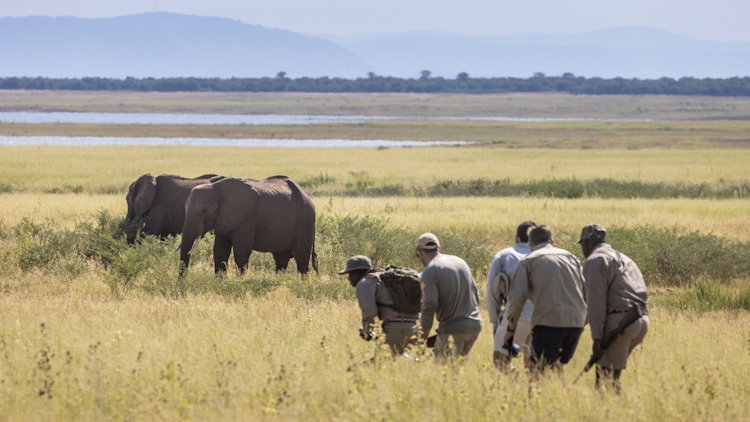
Image by Scott Ramsay
A delightful surprise awaits me at the end of our walk, where a Fothergill Island guide has set up a bush breakfast, replete with coffee and Amarula, a South African liqueur that is splashed into coffee or hot chocolate. We return to camp in the custom-built, open-sided game vehicle, stopping for a breeding heard of elephants to cross the road. Using the interactive iPad on the 4x4, I find the name of a splendid butterfly that I had spotted: a Cream striped swordtail. My camera batteries recharge in the usb points near my seat.
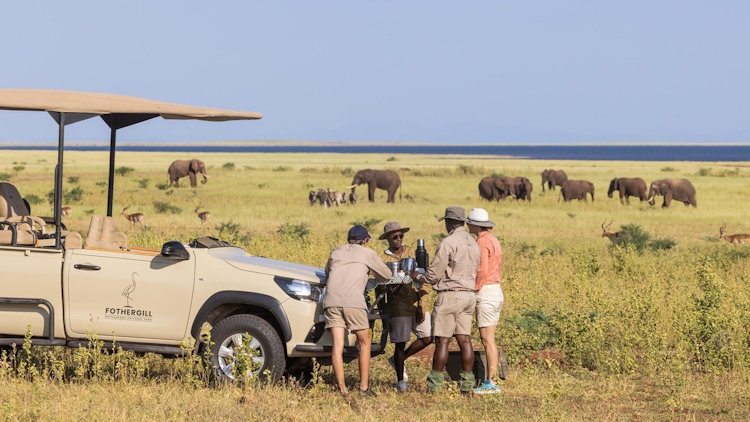
Image by Scott Ramsay
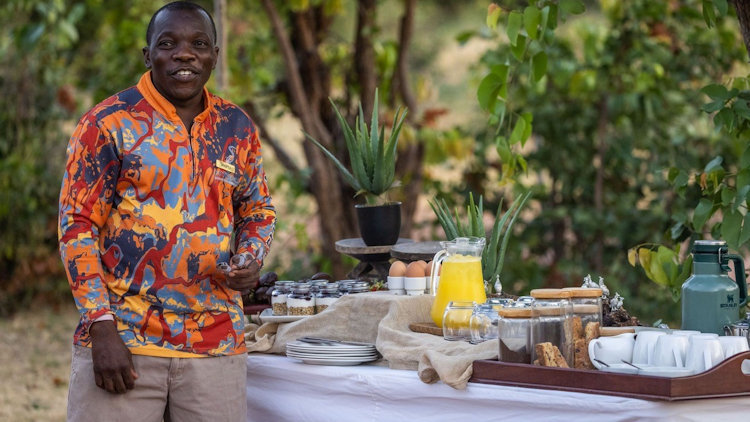
Image by Scott Ramsay
Fothergill Island Camp, built from scratch in 2021, comprises five ultra-luxury tented Suites, two x two-bedded Suites and Little Fothergill, with 3 suites. A specialized Cool breeze cooling system positioned at the head of the beds, cools the tent, augmenting the fresh air that flows through the floor-to-ceiling gauze sides of the Meru-style tent. Decor is contemporary, in a neutral palate, with a cream canvas roof and wooden floors. Accent colors on rugs and cushions hint at the blues of the lake waters.
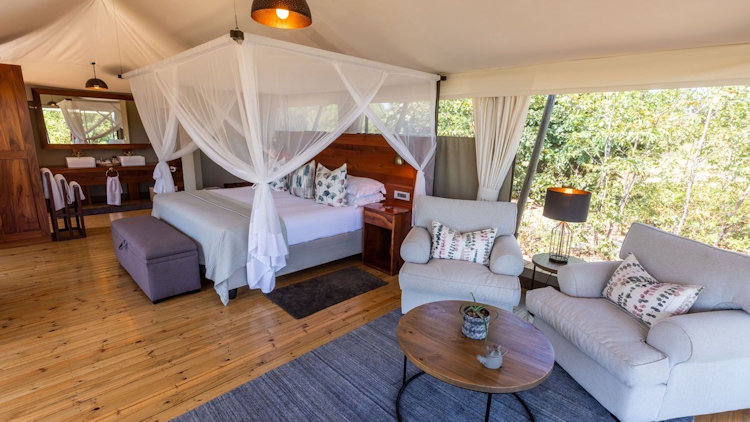
Image by Scott Ramsay
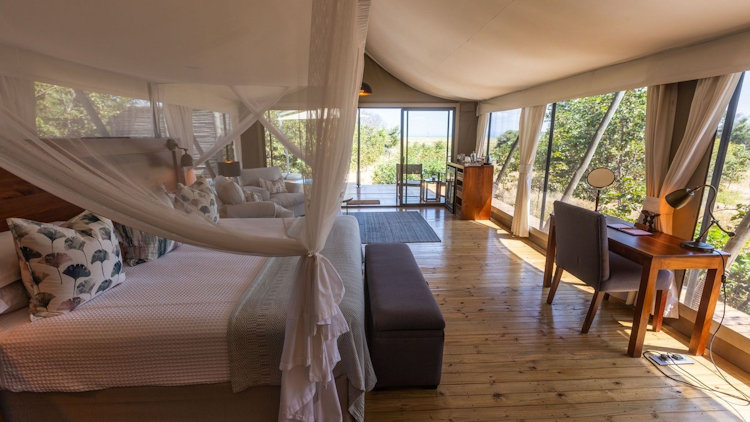
Image by Scott Ramsay
From my Bush Suite - named Ayre, after one of the eagles in the region - secluded in a copse of Zig zag Terminalia trees, Lake Kariba is visible beyond the grassy floodplain. While sipping an iced South African Chenin Blanc in my private plunge pool, I am entertained by chattering tree squirrels and a party of Blue waxbills that bathe and babble enthusiastically in a stone bird bath. Contour feathers are vigorously shaken, wing feathers preened.
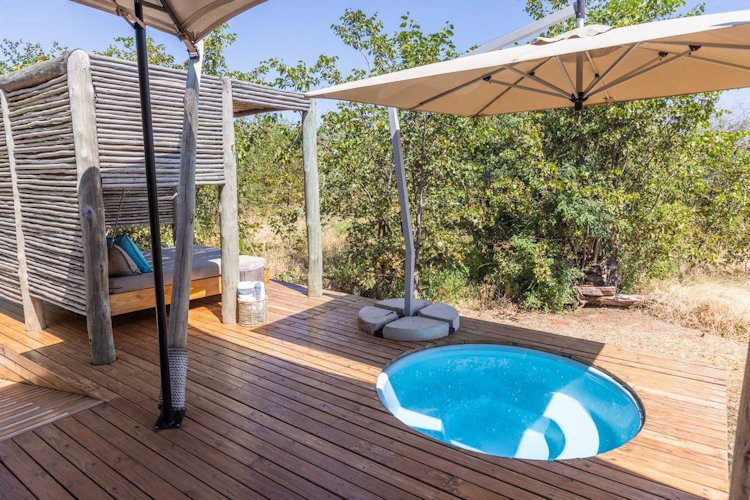
Image by Scott Ramsay
After an alfresco bubble-bath - where butterflies dance above the foam - I stroll along the pathway to the communal area, where I enjoy a gourmet lunch on the main deck. A deconstructed hamburger, fashioned from Zimbabwe’s famous beef, is accompanied by fresh salads. In the evenings, my dinner table is set up in various nooks, each with a sublime view. My favorite space is one next to the lap pool, beneath a roof of wooden sticks, where moonlight penetrates to form striped shadows. The evening meal is an adventure, with an array of dishes created by a team of skilled chefs, using fresh ingredients with an African twist, enhanced with home-made condiments.
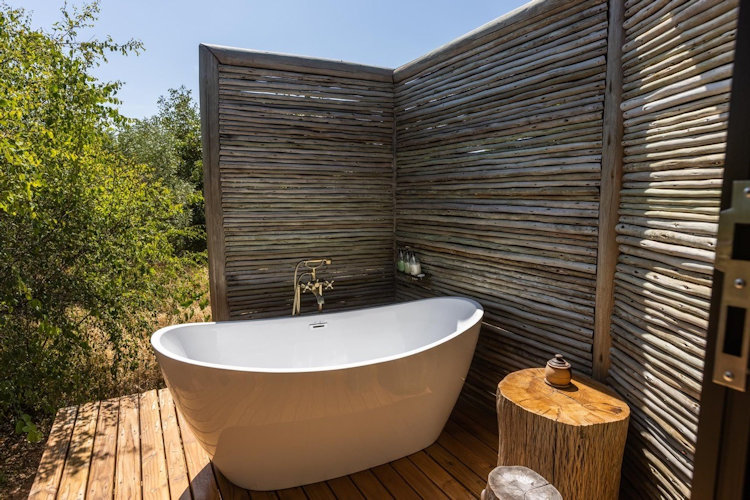
Image by Scott Ramsay
This is no boot camp. Despite the must-try activities like river cruises to the spectacular Sanyati Gorge, catch and release fishing expeditions, archery or stargazing, it’s easy to linger in the tented lounges. Although a friendly family group invites me to join them in a board game, I am drawn to the the coffee table books. Soporific in the pleasant heat, I to return to my tent for an afternoon snooze on my secluded day-bed.
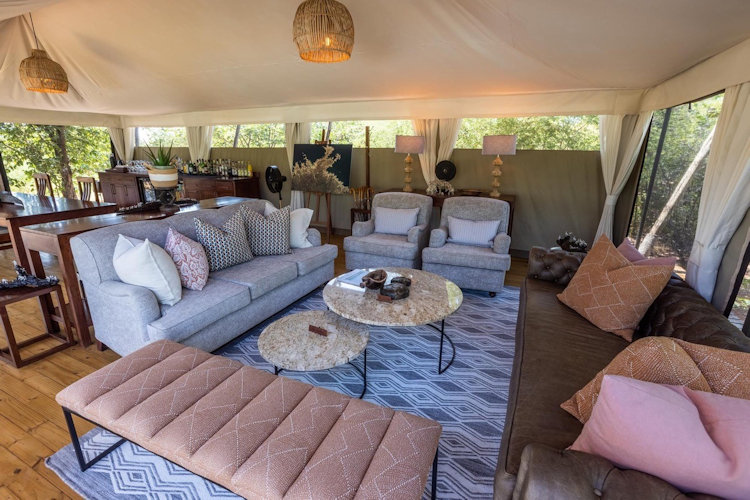
Image by Scott Ramsay
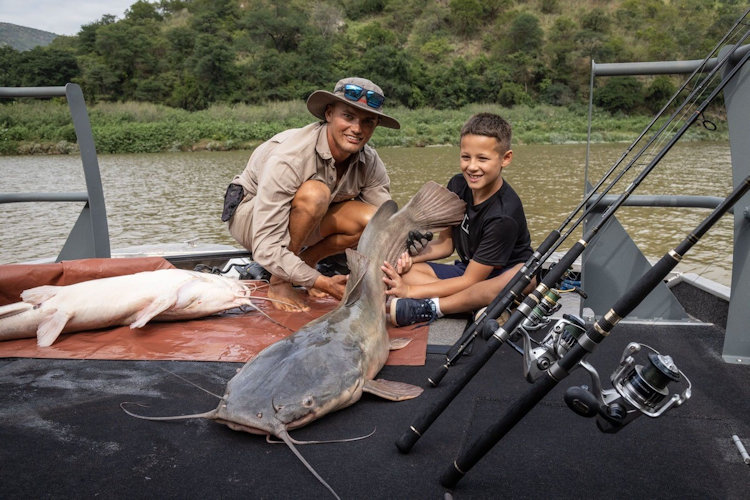
Image by Scott Ramsay
Set in pristine bush, Fothergill Island is the most elegant and upscale camp in the Matusadona National Park. As the camp grounds are fenced and sport manicured lawns in the communal areas, it is a safe place for children to play and to explore. A game of cricket, anyone?
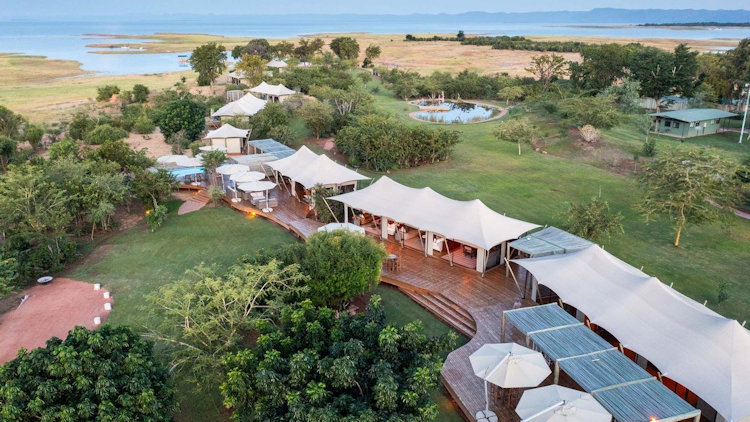
Image by Scott Ramsay
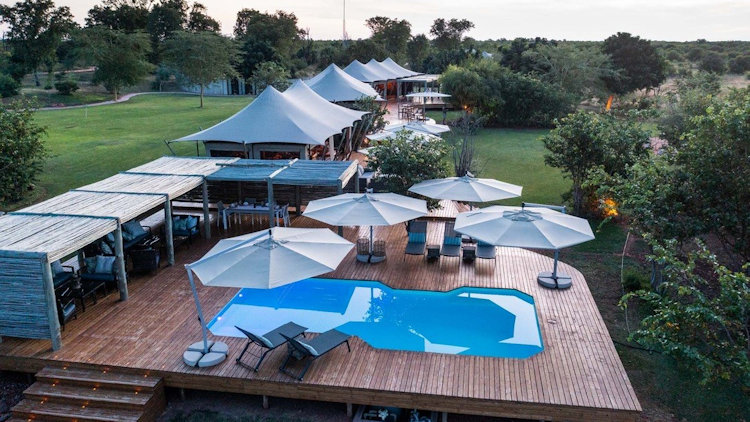
Image by Scott Ramsay
The Fothergill Island’s stylish camp - with its panorama of Matusadona Mountains, bleached trees in the waters of Lake Kariba, plus woodlands and grasslands teeming with game - makes for an inspirational and unique African Safari.
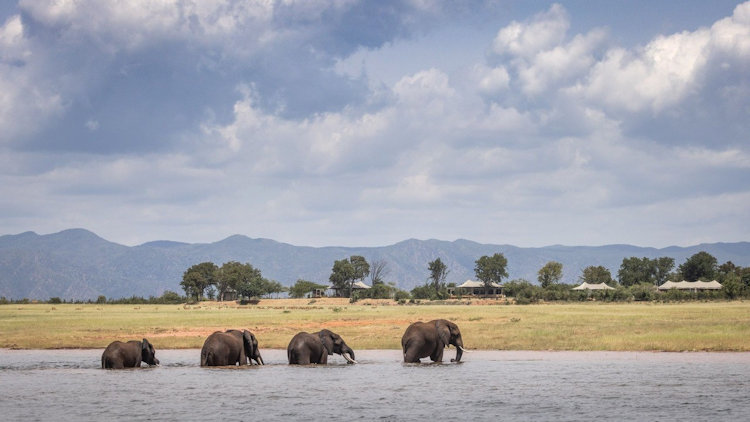
Image by Scott Ramsay
For more features by Gillian McLaren: https://gillianmclaren.blogspot.com/
Getting There
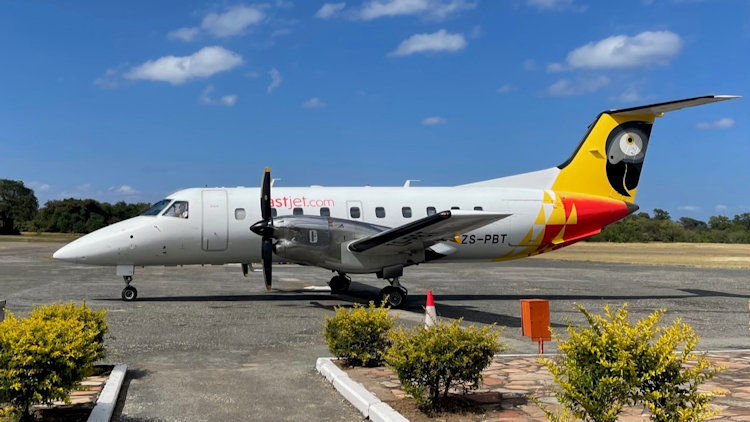
Image by Gillian McLaren
Fastjet operates scheduled flights direct from Oliver Tambo International Airport in Johannesburg, South Africa, to Harare and Victoria Falls. Flights to Kariba operate from Harare and Victoria Falls. Kariba International Airport (KAB) comprises a charming single terminal - with a hedge of bougainvilleas - for domestic and international passengers.
Fothergill Island transfers guests from Kariba International Airport to the harbour on Lake Kariba, then via a comfortable motorboat to the camp. It’s a thrilling journey, with sightings of specialised local fishing boats that catch Kapenta fish at night, plus White-breasted cormorants and other fish-eating birds low-flying over the waves.
Get Involved
African Parks and Conservation Strategy
Fothergill Island partners with African Parks, “A non-profit conservation organisation that takes on the complete responsibility for the rehabilitation and long-term management of national parks in partnership with governments and local communities”. African Parks has signed a 20 year contract with Zimbabwe Parks, to help facilitate the restoration of species in Matusadona National Park.
Using donor finance, a multi-pronged approach is being taken here, with the need to address the efficiency of law enforcement being a priority. For example, instead of a reactive anti-poaching methods, African Parks is expediting the formation of an active counter-poaching strategy. Illegal gold panning along the Ume river has already declined after arrests and the encouragement of strong community engagement. In 2021, 223 Burchell’s Zebra were translocated here, to augment the population. Ten African elephant were collared for better tracking and for research purposes.
African Parks is an NGO that relies on donations to sustain parks such as Matusadona National Park in Zimbabwe. https://www.africanparks.org/
Contact: Toni Condon (Executive Director, USA) tonic@africanparks.org
Amanzi Lodge, Harare, Zimbabwe
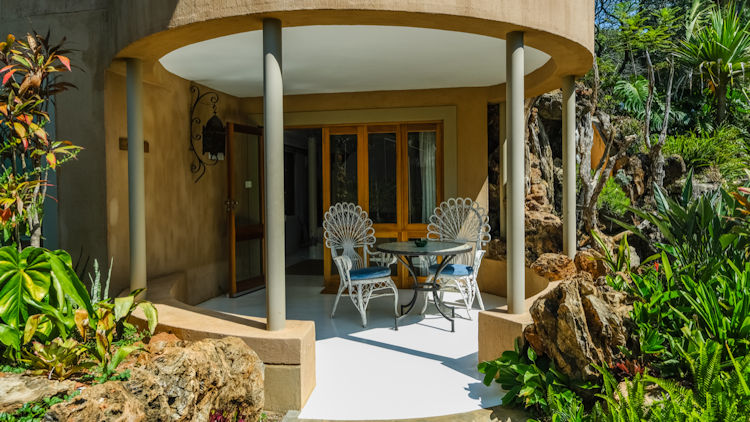
Image by Amanzi Lodge
Perfect for an overnight stay, or a time of relaxation after traveling in Zimbabwe, Amanzi Lodge is an owner run boutique hotel in the Northern suburbs of Harare. Cascading water features, landscaped gardens - including rare cycads, established trees and tumbling bougainvillaeas - provide a tranquil space for swimming, tennis, or alfresco dining. The décor by Julia Mama is charming, with each suite showing a theme from a different African country, represented by contemporary African art and antiquities collected from all over the continent.
Gourmet food at Amanzi highlights local ingredients with creative international twists, based on seasonality, simplicity and the finest quality ingredients. I savored this creative Zimbabwean gastronomy.
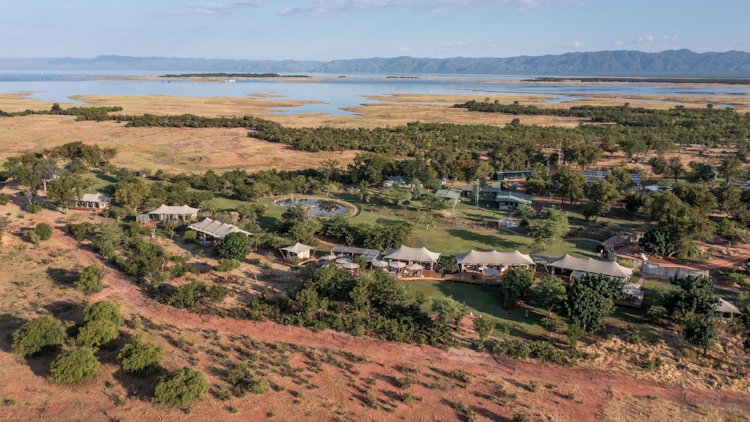
To contact Cayman Airways, you can reach theirHow Do I Contact Cayman Airways at +1 (888) 660-0053. They will assist you with any inquiries or flight-related issues. Happy flying!
ReplyDelete